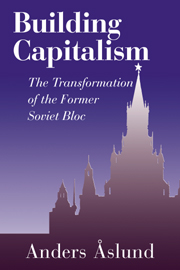Book contents
- Frontmatter
- Contents
- List of Tables and Charts
- Acknowledgments
- List of Abbreviations
- Introduction
- 1 What Communism Actually Was
- 2 The Decline and Fall of Socialism
- 3 Strategic Policy Choices
- 4 Changes in Output and Their Causes
- 5 Liberalization
- 6 Financial Stabilization
- 7 Privatization
- 8 Social Developments and Policy
- 9 State and Politics in the Transformation
- 10 Role of the Outside World
- 11 Conclusions
- Bibliography
- Index
4 - Changes in Output and Their Causes
Published online by Cambridge University Press: 15 September 2009
- Frontmatter
- Contents
- List of Tables and Charts
- Acknowledgments
- List of Abbreviations
- Introduction
- 1 What Communism Actually Was
- 2 The Decline and Fall of Socialism
- 3 Strategic Policy Choices
- 4 Changes in Output and Their Causes
- 5 Liberalization
- 6 Financial Stabilization
- 7 Privatization
- 8 Social Developments and Policy
- 9 State and Politics in the Transformation
- 10 Role of the Outside World
- 11 Conclusions
- Bibliography
- Index
Summary
One of the most important but least understood issues of postcommunist economic transformation is what has actually happened to output. There is no agreement on the fundamental facts, and the statistical uncertainties are so numerous that no consensus is likely to emerge any time soon. The transition started with huge recorded falls in output throughout the region, arousing great controversy. Some argued that a unique devastation was taking place, while others saw a combination of measurement problems and a necessary “creative destruction” in Joseph Schumpeter's sense.
We begin with the official data on what happened to output, for how long its decline lasted, to what extent countries have returned to growth, and how strong and stable growth has become, taking note of the new patterns of growth and lasting stagnation have emerged.
Next, we analyze the huge but varied initial declines in recorded output. Were these declines real? First, we focus on the truly postcommunist decline, deducting the slump in the two last years of Soviet power. Second, we add the increase in the unofficial economy, which is real but unmeasured and which rose sharply especially in intermediary reformers. Third, we deduce worthless production or value detraction from the last communist GDP, as revealed by plummeting manufacturing. Besides, implicit trade subsidies were huge. While these involved real resources, they ceased as a consequence of independence, not transition. My startling conclusion is that radical and some moderate reform countries experienced no contraction of output in their first years after communism, while war-torn and nonreforming countries suffered. The great postcommunist output collapse is a myth.
- Type
- Chapter
- Information
- Building CapitalismThe Transformation of the Former Soviet Bloc, pp. 113 - 158Publisher: Cambridge University PressPrint publication year: 2001



